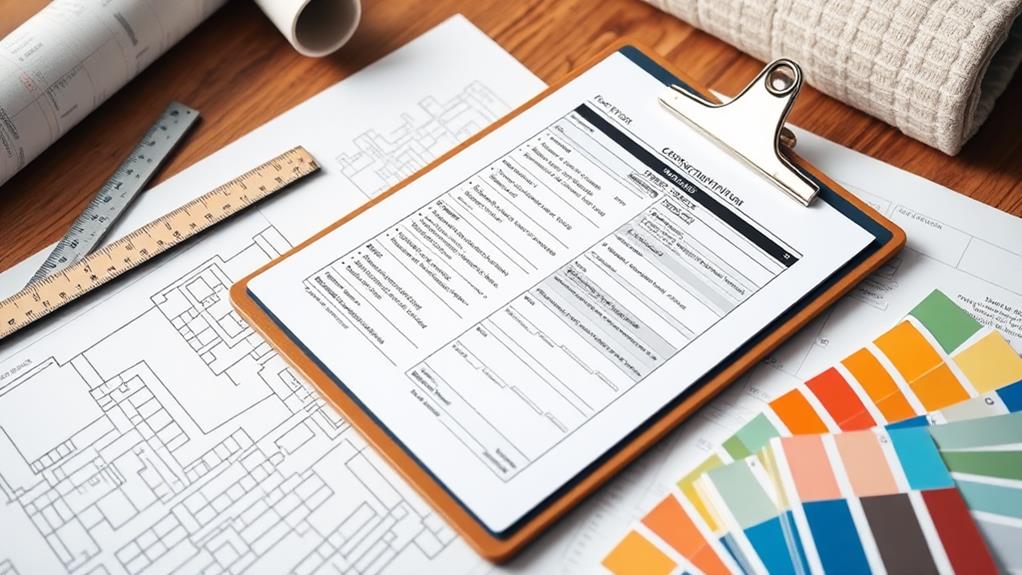When hiring local contractors, it's crucial to know a few key points to guarantee a successful project. First, choose licensed and insured contractors to protect yourself from liability. Always ask for references and seek multiple estimates to compare prices and services. Be cautious with payment—avoid large upfront fees, sticking to a schedule tied to milestones instead. Keep detailed records of contracts and payments to prevent disputes. Communication is essential, so establish clear channels and request regular updates. By understanding these factors, you can confidently navigate the process and manage your home improvement projects more effectively. There's more to explore on this topic!
Types of Local Contractors

When it comes to tackling a construction project, understanding the various types of local contractors can make a significant difference in your experience.
Local contractors can be categorized into three main types: general contractors, specialty contractors, and design/build contractors.
General contractors oversee entire construction projects, guaranteeing they're properly managed and executed. They manage subcontractors, secure permits, and guarantee your project complies with local building codes, which is essential for a successful outcome. This means you'll have someone to coordinate everything, which can relieve a lot of stress.
If you need expert help in one of these areas, hiring a specialty contractor is vital, as they possess the specialized knowledge to guarantee the job is done right.
Reliable local contractors can be invaluable in finding the right fit for your needs.
Design/build contractors combine design and construction services. This integrated approach streamlines the process, making it easier for you as a homeowner. You'll have a single point of contact from the initial design phase through to completion, simplifying communication and decision-making.
Avoiding Contractor Scams
Finding a reliable contractor can feel overwhelming, but taking steps to avoid scams can make the process smoother. When hiring a contractor, always choose one who's licensed and insured. This protects you from liability if accidents occur and guarantees they follow local regulations.
Additionally, it's vital to check for any disciplinary actions against the contractor, as this can provide insight into their professionalism and reliability, along with reviewing their project management practices.
Seek referrals from friends or family and check the contractor's history through local consumer protection agencies or the Home Builders Association. Obtaining multiple written estimates is essential; these should detail the scope of work, materials, and costs. Be cautious of bids that are greatly lower than others, as they might indicate a scam.
Before signing any contract, read it carefully to understand the terms and conditions. Unclear language can lead to disputes or even issues with contractor liens down the line.
Additionally, be wary of home improvement loan scams that pressure you into making quick decisions. Always take your time to shop around for financing options and make sure you understand all loan terms before agreeing.
Understanding Payment Practices

Understanding payment practices is vital for a successful contractor relationship. When working with local contractors, it's important to establish clear guidelines about how and when payments will be made.
Here are four key points to take into account:
- Payment Schedule: Typically, you'll want to avoid paying the full amount upfront. A common practice is to provide one-third of the total cost as a deposit, with the rest tied to project milestones.
- Sign a Contract: Always sign a contract that outlines the payment terms. This guarantees both you and the contractor are on the same page and protects your interests.
- Documenting Payments: Keep detailed records of all payments made, including receipts and invoices. This documentation is critical in case of any disputes or misunderstandings.
- Insurance Coverage: Verify that the contractor has proper insurance coverage. This protects you from potential liabilities during the project.
Navigating Contractor Liens
When you hire local contractors, it's important to understand contractor liens and how they can affect your property.
To protect yourself, ask for lien waivers and keep detailed records of all payments and contracts.
If a lien is placed on your property, consulting a legal professional can help you navigate the situation and guarantee your rights are protected.
Understanding Contractor Liens
Contractor liens can considerably impact your property ownership, especially if left unresolved. If a contractor completes work on your property and you don't pay them, they might place a lien against your home. This can complicate ownership and make selling your property difficult.
Here are some key points to understand about contractor liens:
- Unpaid Work: If contractors or subcontractors aren't paid for their services, they can file a lien against your property.
- Lien Waivers: Always request lien waivers from contractors after payment to guarantee they won't file a lien later.
- Documentation: Keep thorough records of all contracts, payments, and communications related to the work done. This documentation can help defend against potential lien claims.
- Legal Advice: If you face a lien issue, seeking legal advice is vital. An impartial notary should notarize any documents related to the lien.
Protecting Against Liens
To safeguard your property from potential liens, it's vital to take proactive steps throughout your project. When hiring contractors, make sure you understand how liens work in your state. In Texas, for instance, you can request lien waivers, which confirm that all subcontractors and suppliers have been paid. This can protect you against unexpected liens on your property.
Maintaining detailed records of contracts, payments, and communications is essential. Keep track of all your payments to contractors and make certain you have receipts. If disputes arise, these records will help you defend against contractor liens and demonstrate that you've complied with payment terms.
It's also important to stay informed about the specific regulations governing contractor liens in your state, as these laws can vary greatly. Knowing your rights as a homeowner will empower you to handle any issues that may come up.
If you ever face a lien issue, consulting with legal counsel can be wise. They can guide you through the complexities of lien laws and help protect your property rights effectively.
Legal Consultation Importance
Maneuvering through the complexities of contractor liens can be intimidating, making legal consultation an invaluable resource. Understanding your rights and options is crucial when dealing with these situations. A legal expert can provide guidance on how to protect yourself effectively.
Here's what you should consider:
- Know the Regulations: Each state has specific laws governing contractor liens, so familiarize yourself with the rules in your area, like Texas.
- Request Lien Waivers: To guarantee payments are made to subcontractors and suppliers, request lien waivers from your contractors.
- Document Compliance: Keep thorough records of all contracts and payments, which can be essential for defending against potential liens.
- Seek Legal Advice: If a lien is placed on your property or you face a lien issue, consult a lawyer to understand your rights and options.
Notarization by an impartial notary is also crucial when dealing with liens, as it adds legitimacy to your documentation.
Key Questions to Ask

When hiring local contractors, asking the right questions can make all the difference in guaranteeing a successful project. Start by inquiring about the number of similar projects the contractor has completed in the past year. This helps you assess their experience and reliability for your specific needs.
Next, confirm whether your project will require any building permits. Ask how the contractor plans to manage that process to guarantee compliance with local codes.
Don't forget to request a list of references from previous clients. This will give you insight into the contractor's past performance and customer satisfaction.
It's also essential to verify the types of insurance coverage the contractor holds, especially for liability and damages. This guarantees they're adequately protected against potential risks.
Recognizing Home Improvement Loan Scams
When you're considering home improvement loans, be cautious of offers that seem too good to be true, like low interest rates or guaranteed approvals.
Scammers often use pressure tactics to rush you into decisions without giving you enough time to think.
Always research loan terms thoroughly and read everything before signing, so you don't fall victim to unexpected obligations.
Unrealistic Financing Offers
How can you tell if a financing offer is too good to be true? When considering home improvement projects, be cautious of unrealistic financing offers that promise quick approval or shockingly low interest rates.
These deals often hide pitfalls that can lead to financial trouble. Here are four red flags to watch for:
- Instant Approval: If a contractor guarantees immediate financing, it's likely a scam. Legitimate lenders need time to assess your financial situation.
- Low or No Interest Rates: Offers that seem too good to be true often are. Always compare interest rates from multiple lenders.
- Pressure to Sign a Contract: If a contractor rushes you to sign a contract without explaining terms, take a step back. You should fully understand what you're agreeing to.
- Vague Terms: If the financing offer lacks clear details, it's a warning sign. Always verify the legitimacy by consulting financial advisors or consumer protection agencies.
Pressure Tactics
In the world of home improvement, pressure tactics can easily lead you into a financial trap. Be on guard against contractors who push you to make immediate decisions about financing. Scammers often use high-pressure sales tactics, like claiming limited-time offers or threatening price increases, to rush you. If a contractor pressures you to sign quickly, that's a red flag.
You need to fully understand all loan terms before committing. Legitimate lenders provide clear customer service and explain every detail, while scammers often offer financing terms that seem too good to be true. Always shop around and compare loan options from reputable lenders.
Avoid signing blank documents or those you haven't read completely, as this can lead to unexpected commitments. Take your time to evaluate your work and financial capabilities.
If something feels off, trust your instincts and walk away. Remember, a good contractor should respect your need for time to think things through. Protect yourself by being informed and cautious when discussing financing.
Don't let pressure tactics dictate your decisions; stay in control of your home improvement journey.
Research Loan Terms
Scrutiny is essential when considering home improvement loans, as understanding the terms can protect you from scams that prey on unsuspecting homeowners.
To avoid falling victim to predatory practices, here are some important steps to follow:
- Research loan terms: Carefully review all aspects of the loan, including interest rates, repayment schedules, and total costs.
- Shop around: Don't settle for the first offer. Compare loan terms from multiple lenders to find the best deal for your financial situation.
- Understand contractor financing: Be wary of contractors who push you to make quick financing decisions without giving you time to think or compare options.
- Avoid signing blank documents: Always read and understand what you're signing. Scammers may exploit blank or unread documents to include unfavorable terms later.
Benefits of Hiring Locally

Supporting local contractors brings a wealth of benefits that extend far beyond individual projects. When you hire local, you're not just getting work done; you're boosting the local economy. This support creates jobs and encourages community investment, which enhances overall economic stability.
Plus, local contractors have a deep understanding of area-specific building codes and regulations. This knowledge helps reduce the risk of costly mistakes and project delays, giving you peace of mind.
A local contractor should be able to establish strong relationships with nearby suppliers, allowing them to secure better pricing and faster material delivery. This means you'll receive high-quality materials without unnecessary delays.
Additionally, because local contractors are familiar with the unique climate and terrain, they can recommend suitable materials and innovative solutions tailored to your environment.
Effective Communication Strategies
Effective communication strategies are essential for successful relationships between clients and contractors, ensuring projects run smoothly. When you hire a contractor, being clear and open in your communication can lead to better outcomes.
Here are some effective communication strategies to evaluate:
- Accessibility: Make sure your contractor provides multiple ways to communicate, like phone, email, and in-person meetings. This helps address client inquiries quickly.
- Regular Updates: Request consistent updates on project progress. This keeps you informed about any changes or challenges that arise during the project.
- Proactive Problem-Solving: Encourage your contractor to tackle any unforeseen issues immediately. Prompt communication about solutions builds your confidence in their work.
- Comprehensive Planning: Discuss costs, timelines, and potential challenges in detail. This alignment reduces the chances of miscommunication and keeps both parties on the same page.
Importance of Project Documentation

Clear communication with your contractor sets the stage for successful project execution, but it's just as important to back that up with thorough documentation. Keeping a job file that includes the contract, scope of work, invoices, and correspondence is essential for tracking project progress. This file provides a clear record of all agreements made during the project, which can help you avoid misunderstandings.
Documenting all change orders in writing is imperative. It guarantees both you and the contractor are aware of any modifications to the original agreement, helping to prevent disputes later on. Additionally, maintaining detailed records of communications, like emails and certified mail, can serve as evidence if conflicts arise.
Comprehensive documentation of work quality and milestones is also critical. It aids in addressing disputes regarding payment or project completion effectively.
Conclusion
Hiring local contractors can greatly enhance your home improvement projects, especially since 80% of homeowners report higher satisfaction when working with nearby professionals. By understanding types of contractors, avoiding scams, and asking the right questions, you can guarantee a smoother experience. Remember to communicate effectively and document your project every step of the way. By investing time in research and preparation, you're setting yourself up for success while supporting your local economy.


Leave a Reply